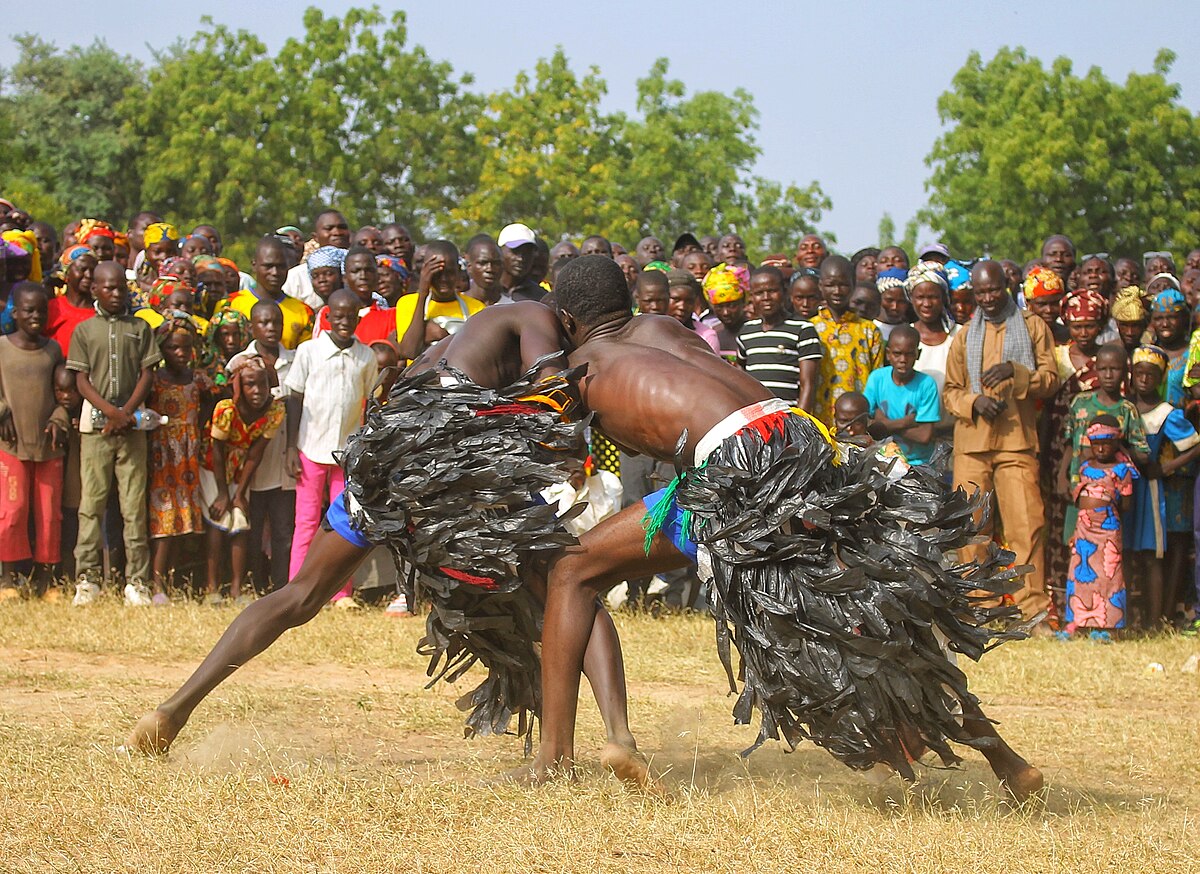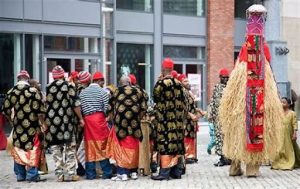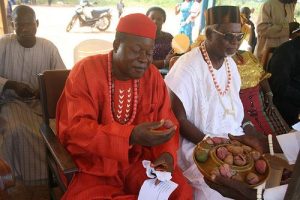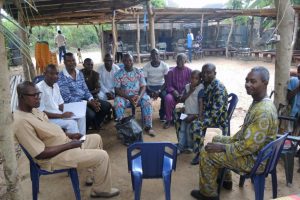A major cultural event in Igboland embodying the ideals, history, and community spirit of the Igbo people, the traditional wrestling festival, Igba Mgba More than simply a sport, wrestling—mgba in Igbo—is a rite of passage, a test of strength, and a celebration of the continuity and vitality of the community. Deep roots in Igbo customs, the celebration is still very important in helping the Igbo people to preserve their cultural legacy. The background, cultural value, customs, and contemporary relevance of Igbo Mgba in Igboland are investigated in this paper.
Historical Context
For millennia, Igbo people have embraced wrestling as a fundamental activity from which their roots are strongly ingrained in their customs. In Igbo civilization, wrestling has many uses historically. It was a technique of settling disputes, deciding on leadership, and highlighting young men’s athletic ability. With wrestling events were scheduled during the harvest season, a period when communities celebrated strength and plenty, the sport was intimately connected to the agricultural calendar.
Wrestling was also a means of young men seeking respect and recognition within their societies in pre-colonial periods. In the wrestling ring, success may result in social elevation as winning wrestlers were often revered as heroes and could win the respect of powerful members of the society. The sport was recognized as a fundamental component of masculinity, and young men entering maturity was expected to go through wrestling events as a rite of passage.
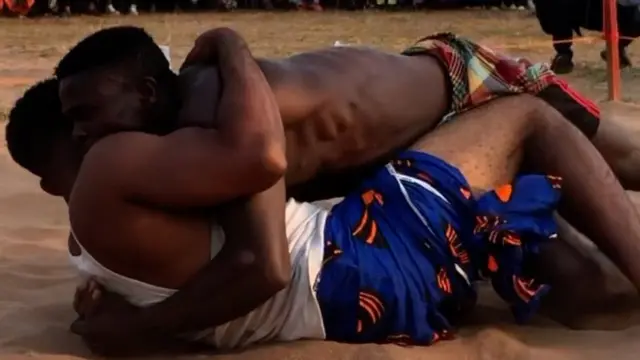
Cultural Significance
Beyond the sport of wrestling, the Igbo Mgba celebration captures the ideals and character of the people. The celebration is a group activity that unites individuals of all ages, therefore promoting continuity and togetherness. This is a moment when the society comes together to praise moral values such justice, bravery, and honor in addition to athletic ability.
Usually occurring on an open field or town square, the festival provides the wrestling venue. As fans swarm to see the battles, support their favorite wrestlers, and engage in the celebrations, the air is infused with exhilaration. Playing traditional instruments, drummers and musicians provide a rhythmic background that energizes the wrestlers and increases the intensity of the battles.
Wrestling itself is laden with ritual and symbolism. Wrestlers often conduct ceremonial dances or participate in pre-match rituals asking for the blessings of the gods and ancestors before the contests start. These customs are supposed to provide the wrestlers spiritual power and protection, therefore guaranteeing that the contests be carried out honorably and ethically.
Rituals and Practices
The Igba Mgba wrestling contests are ceremonial events governed by certain rites and conventions, not just about physical struggle. Usually including bathing in holy water, using certain medicines, or being blessed by seniors or spiritual leaders, the wrestlers go through purifying rites before a bout starts. These ceremonies are supposed to release any bad energy from the wrestlers and get them ready for the fight.
The contests are conducted with great respect for conventional ethics and regulations. Sportsmanship, respect of their opponent, and community values adherence are demanded of wrestlers. Usually an elder or a respected member of the society, the referee officiating the bouts guarantees that the rules are obeyed and that the competition stays fair.
In a wrestling bout, victory is a celebration of community rather than just a personal one. Usually placed on the shoulders of his fans, a wrestler’s triumph is paraded around the stadium. Celebrating the wrestler’s power and ability, the community honors the triumph with eating, dancing, and singing. As a mark of the community’s respect, the winning wrestler can also receive presents like cattle or other priceless objects.
The Role of Elders and Spiritual Leaders
Elders and spiritual leaders are very important in Igba Mgba as they preserve the customs and ideals of the celebration. They are in charge of supervising the ceremonies and ensuring that the celebration follows cultural standards. Elders often give the wrestlers direction on how to behave both inside and outside of the wrestling arena.
The celebration may also be attended by spiritual authorities like diviners or conventional priests. To guarantee that the wrestlers are spiritually ready for the tournament, they carry out the rites meant to call the protection and blessings of the ancestors and gods. These leaders stress the deep-rooted ideas that support Igba Mgba and therefore strengthen the link between the physical and spiritual sides of the celebration.

Igba Mgba as a Rite of Passage
For young males in many Igbo towns, Igba Mgba is a rite of passage. One of the most important steps in the change from young to maturity is viewed as being attending the wrestling events. Considered as evidence of maturity, strength, and ready to assume the duties of masculinity is the ability to wrestle and succeed in the arena.
Wrestling in Igba Mgba gives young men a chance to show off to their parents, friends, and possible mates. A young man’s reputation in the society might improve with success in the arena, therefore increasing his eligibility for marriage or leadership positions. Therefore, the celebration is rather important in determining the social structure of the society and in supporting the moral principles of duty, honor, and strength.
Modern-Day Relevance
Although Igbo Mgba’s customs have been mostly unaltered, the festival has evolved to fit the changes brought about by globalization and modernism. Many Igbo groups, both rural and metropolitan, still honor Igba Mgba in modern times. Still a vivid statement of Igbo cultural identity, the celebration links the past with the present.
Igba Mgba has grown to be a major focus for cultural tourism in certain areas, drawing people eager to experience traditional Igbo life. Beyond Igboland, the festival has also become well-known as wrestling contests are part of cultural celebrations and festivities all throughout Nigeria and beyond. This has spurred cultural preservation and increased knowledge about Igbo customs.
Notwithstanding these developments, the fundamental Igbo values—strength, bravery, honor, and community—resonate with the people. Reminding the Igbo of their rich legacy and the need of preserving their customs in a fast changing environment, the celebration continues to be a potent emblem of cultural pride and resilience.
Conclusion
Celebrated in Igboland, the traditional wrestling event Igba Mgba honors strength, community, and cultural continuity. Deeply ingrained in centuries-old customs, the festival reflects the values and culture of the Igbo people and functions as both a sports event and a rite of passage. By means of its customs, rites, and group involvement, Igba Mgba emphasizes in Igbo community the values of honor, integrity, and spiritual connectedness.
Igba Mgba is still very much relevant culturally in the current world as it reminds us of the continuing life and vigor of Igbo customs. Even if the festival changes to fit modern issues, it is still a vivid and beloved part of Igbo cultural identity that guarantees the vitality of mgba—the will and fortitude of the Igbo people—lives on for next generations.
Please read all our stories on African Culture here
